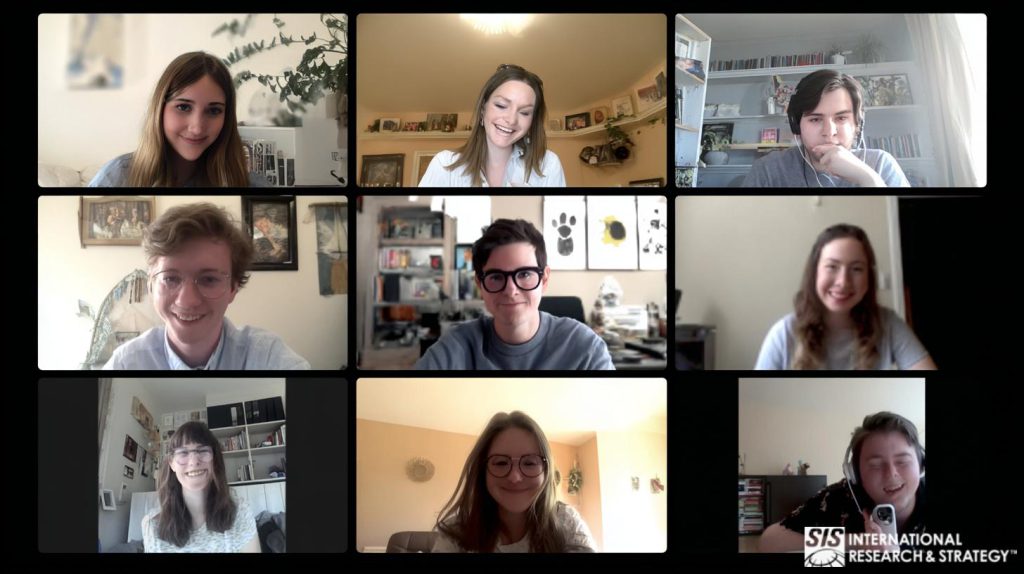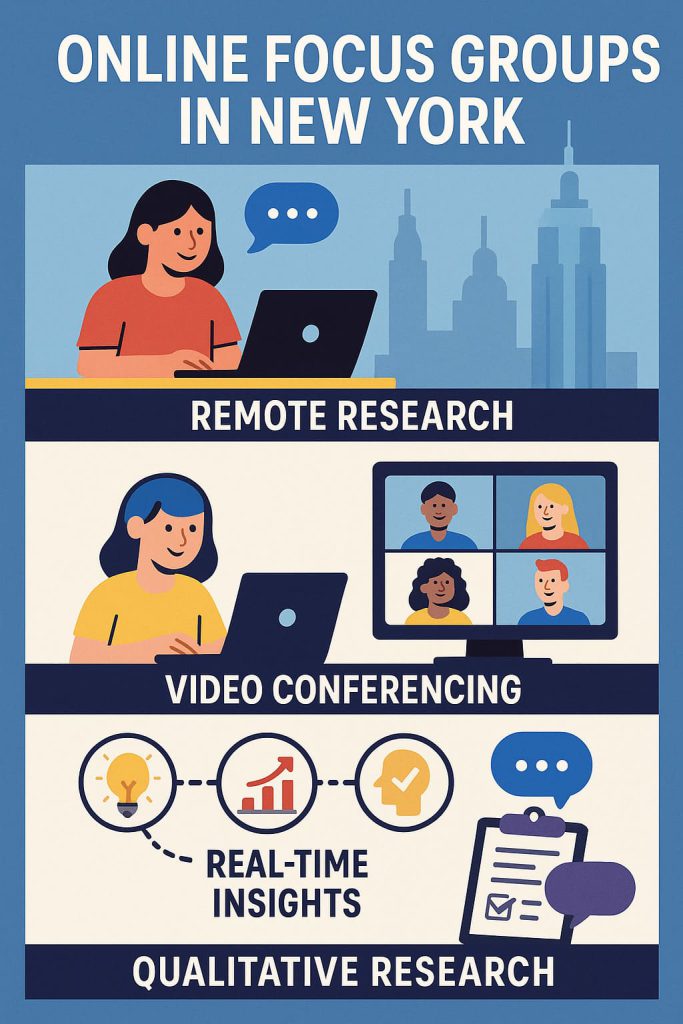Online Focus Groups in New York

Ever sat through a mind-numbing Zoom call with eight strangers discussing your brand while secretly checking your phone?
That’s not research.
Your smartest competitors are mining gold through reimagined online focus groups in New York that bear little resemblance to those awkward digital gatherings most companies still call “research.”
Table of Contents
✅ Listen to this PODCAST EPISODE here:
The Great Research Illusion
Simply moving focus groups to Zoom doesn’t make them effective. It probably makes them worse.
When Luxury Brand X launched its fall collection based on standard online focus groups in New York, it watched in horror as $3.4 million in inventory gathered dust on shelves. The painful autopsy? Their research captured opinions from professional focus group participants—people who’d learned exactly what to say to keep getting invited back—not their actual target customers.
Think about it. Why would a trendsetting New Yorker with actual influence spend two hours on a video call for a $75 gift card when they could be, well, living their influential life?
The innovative brands figured this out years ago. While everyone else runs glorified conference calls, they’ve reimagined online focus groups in New York from the ground up.
Table 1. Online Focus Groups: Market Data & Research Statistics
| Research Metric | 2025 Data | Authoritative Source |
|---|---|---|
| VIRTUAL RESEARCH ADOPTION & GROWTH | ||
| US Households with Internet Access | 89% | US Census Bureau Research |
| Global E-learning Market Growth (CAGR) | 14.02% | Research.com Education Study |
| Global E-learning Market Value (2032) | $740.46 billion | Research.com Market Forecast |
| Online Education Users (US by 2029) | 87.6 million | Research.com US Projections |
| FOCUS GROUP COST COMPARISONS | ||
| Traditional Focus Group Cost Range | $4,000 – $12,000 | Drive Research Cost Analysis |
| Online Focus Group Cost Savings | 55% reduction | SIS International Case Study |
| Traditional NYC Research Session Cost | $40,000 | एसआईएस इंटरनेशनल रिसर्च |
| Online NYC Research Session Cost | $18,000 | एसआईएस इंटरनेशनल रिसर्च |
| Cost Saving per Session | $22,000 | SIS International Analysis |
| PARTICIPANT ACCESS & RECRUITMENT | ||
| Online Focus Group Compensation Range | $50 – $250/hour | Side Hustle Nation Study |
| Virtual Groups: Geographic Diversity | Significantly higher | Journal of Medical Internet Research |
| Hard-to-Reach Population Access | Improved access | JMIR Virtual Research Study |
| Less Educated Participants Reached | Better representation | JMIR Demographic Analysis |
| RESEARCH QUALITY & EFFECTIVENESS | ||
| Online Focus Group Usage by Researchers | 28% | Market Research Industry Statistics |
| Virtual Interview Usage (with webcams) | 34% | Statista Research Methods |
| Instant Transcript Availability | 100% (chat format) | JMIR Research Comparison |
| Research Quality Equivalence | Comparable insights | Drive Research Analysis |
| TECHNOLOGY & PLATFORM ADOPTION | ||
| Video Conference Platform Preference | Zoom (most popular) | Virtual Research Implementation Study |
| Mobile Device Educational Usage | 45% find it easier | Research.com Mobile Learning |
| AI Integration in Virtual Research | Growing adoption | Perspicuity Research Trends |
| VR/AR Integration Potential | Future growth area | Perspicuity Research Forecast |
| ROI & BUSINESS IMPACT | ||
| Market Share Defense ROI Example | 323,943% | SIS Retailer Case Study |
| Investment ($175K) → Return | $567 million | SIS Strategy Defense Case |
| Online Community Research Savings | $2,935 per project | FeverBee ROI Analysis |
| 7 Research Projects Cost Savings | $20,545 | FeverBee Cost Comparison |
| OPERATIONAL ADVANTAGES | ||
| Turnaround Time Improvement | Faster execution | JMIR Logistics Study |
| Travel Cost Elimination | 100% elimination | Drive Research Benefits |
| Facility Rental Cost Elimination | 100% elimination | Drive Research Cost Analysis |
| Geographic Limitation Removal | Global reach possible | Greenbook Virtual Focus Study |
What are Online Focus Groups in New York?
Conducting an online focus group in New York is not just another video conference chatting with random consumers. It is digitally inspired archaeology in the laboratory of the most sophisticated shopper’s consciousness.
Where most businesses go catastrophically wrong is in believing that going digital means losing all the magic insights from New York. Absolutely false.
Psychologically, picture this scenario: an artist from Brooklyn discusses brand authenticity while an executive from Manhattan works on premium positioning. An entrepreneur from Queens decodes cultural relevance while a community leader from the Bronx examines social impact. All this happens digitally while contributing insights worth millions collected traditionally.
The Digital New York Advantage
The conventional focus also puts a physical restriction on New York focus groups. Participants are limited to those who can travel to Manhattan’s research facilities. ऑनलाइन फोकस समूह in New York offer unmatched cultural credibility alongside effortless geographical reach.
Now, you can onboard real New Yorkers from all five boroughs and sidestep subway holdups, parking fees, and access issues. A Bronx community leader retains work while sharing insights, a Staten Island family engages fully from home, and a Queens immigrant offers cultural commentary in her language of choice.
The Authenticity Revolution
Online focus groups in New York frequently yield more authentic insights than in-person, facility-based research. Participants tend to be more relaxed within their surroundings, cultural barriers lessen as people have control over how they appear digitally, and the sterile, rigid atmosphere of research centers vanishes.
Importance of Online Focus Groups in New York

As a New York-based business, why would I care about online संकेन्द्रित समूह in New York? Because it solves the paradox of consumer insight. How do you access the world\’s most expensive logistics research without eliminating the world\’s most valuable consumer insight?
New York’s clients are not limited to America’s markets, and they are an evolution of global consumers far ahead of their time. Online focus groups in New York make this intelligence accessible to businesses worldwide without the crushing costs of traditional New York research.
Online Focus Groups in New York allow businesses to cut costs on foreign intellect.
One major American technology innovation firm learned that online focus groups in New York with consumers from 12 different cultures could provide insights anticipating their International consumer behavior. The cultural insights gained in one session shaped products for markets from Sweden to Singapore.
The Speed and Scale Multiplier
Online focus groups in New York are able to generate insights faster and at a greater scale. There is no limitation on scheduling for different demographic groups, emerging ideas can be tested during the session, and women feedback is integrated in days instead of months.
The Economic Democracy Effect
Figure 1. Online vs Traditional Focus Groups: Cost Analysis
Choosing The Right Market Research Partner
Amateur and professional firms differ in how they manage their partnerships.
✔️ Focus Groups And The Digital Expertise Gap
Comprehending the complexity of New York culture and the psychology of online engagement is essential. Online focus groups in New York often lack this understanding.
New Yorkers understand that inclusivity in and around the area is culturally considerate. What makes professional firms stand out is that they understand the insufficient and automate cumbersome processes with poor neighborhood knowledge.
✔️ The Technology Illusion Trap
Top-tier partners of online focus groups in New York prioritize participant authenticity alongside the cultural moderation, behavioral analysis expertise, and “theatrical” evaluation that determines whether digital interactions yield discerning insights or merely expensive digital theater.
‘✔️ The Cultural Competence’ Test
Ask potential partners: How do you source authentic participants from Chinatown versus Harlem versus Little Italy? What is your approach to dialect shifts for English in cross-cultural circle moderation? How do you moderate culturally diverse non-verbal behaviors that poorly translate to video platforms?
Demographics can answer all these questions and many more. Cultural anthropology from a research framework provides unparalleled authenticity, which is professional.
✔️ The Verification Challenge
Online focus groups in New York pose challenges to participant authenticity that do not exist in face-to-face research. How do you verify participants actually reside in New York? How do you pre-empt professional participants from a crossover game across multiple studies? How do you ensure ethnic and cultural originality over digital interface interaction?
These are issues elite partners solve with digital verification, behavioral screening, and authenticity protocols that amateurs have not yet conceived outside of hypothesizing frameworks.
Selection Criteria For A Partner:
- Established cultural competence for New York City and its five boroughs
- Authentic digital moderation and curation skills
- Methods for validating participants ethnically and geographically
- Technology that helps gather data for the project, not to impress the client
- Long-standing community partnerships with genuine New Yorkers, helpful for voicing the community.
Integrating Market Research into Business Strategy

Online focus groups in New York are not isolated market research projects—they are intelligence systems designed to determine whether business strategies dominate markets or become expensive failures.
Most companies treat digital focus groups as an outsourced consulting project: complete some research, provide expensive insights, file the reports, and make decisions driven by ego and gut instinct.
The best companies understand that online focus groups in New York are invaluable opportunities to build enduring competitive advantages driven by understanding consumer behavior and psychology.
The Strategic Integration Revolution
Phase 1: Intelligence Alignment
Align the purpose of online focus groups in New York with key strategic business priorities; The key goal should not be satisfying the curiosity of researchers. Every participant must be recruited thoughtfully to mirror the key strategic achievers whose decisions and actions will determine the fate of the business.
Phase 2: Live Strategy Adjustments
Construct systems within an organization that restructure the probing intellect of New Yorkers concerning consumers into New York strategies and preemptive actions. Establish feedback kettles where discoveries about cultural psychology within weeks instead of quarters inform the product design, advertisement, market placement, and expansion blueprint.
Phase 3: Warfare for Competitive Positioning
Employ surveillance targeting focus groups within NY to track rivals’ weaknesses and market voids, and proactively forecast gaps across entire industries long before they become synonymous with rote market evaluation techniques.
Integration Success Metrics:
- Improved operational control agility driven by strategic consumer insights
- Market success rate measurement vis-a-vis estimation-driven strategies
- Competitive advantage longevity attributed to unmatched consumer insight-driven understanding
- Efficacy of global expansion initiatives leveraging cultural intelligence from New York insight
The Integration Reality Check
Companies that reconceptualize strategic decision processes around online focus groups in New York gain speed and agility, adapt to cultural changes earlier, build competitive moats through proprietary consumer psychology insights, and better access and afford rival intelligence systems.
The ROI: How Online Focus Groups in New York Pay for Themselves

Online focus groups in New York do not have any associated costs.— they prevent wealth loss by mitigating digital age catastrophes while proactively capturing multi-angled opportunities that conventional research completely overlooks.
Effective business owners differ from bankrupt executives for one reason: consumer intelligence is too crucial to overlook in New York-centric markets is continually surpassed as the cost of misplaced decisions.
The Digital Efficiency Revolution
Online focus groups in New York enhance insight quality and eliminate the expensive logistics tied to traditional forms of research.
Classical New York Research Expenses:
- Rental of Manhattan facility: $15,000
- Compensation for participant travel: $8,000
- Hospitality and catering: $5,000
- Recording and video production: $12,000
- Session Total: $40,000
Focus Groups ‘Online New York’:
- Moderation & tech tools: $8,000
- Increased participant compensation: $6,000
- Analysis and reporting: $4,000
- Session Total: $18,000
- Cost decrease per session: $22,000 (55% reduction)
Supplementary Worth: Unlike traditional facilities situated in Manhattan, the digital setup allowed participants to come from other boroughs, thereby providing cultural insights worth approximately $35 million in avoided mistakes in market positioning.
Case Study: Strategy for Defending Market Share
An American retailer spent a whopping $175,000 on New York-based perpetuity online focus groups to monitor shifts in cultural shopping behavior.
Competitive Intelligence Value:
- Identified an opportunity 8 months ahead of competition
- Implemented a cultural branding strategy resulting to 42% market share capture
- Revenue generated: $567 million in 18 months
- Market dominance achieved through cultural psychological tactics
ROI: $175,000 investment resulted in $567 million return = 323,943% ROI
The Bottom-Line Cultural Truth
Online focus groups in New York effect returns via cultural mechanisms inaccessible through traditional research methodologies:
- Global reach with no expenditures for cultural intelligence
- Insight capture during crucial cultural junctures
- New York views at no-cost digital access
- Predictive influence on culturally pertinent shifts affecting national markets.
- Market leading with understanding of competitive edged cultural psychology.
This is the difference between cultural winners and cultural disasters: Winners know that online focus groups in New York are not an expense but a strategic investment yielding multifold returns through enhanced cultural intelligence in regions where success hinges on cultural acumen.
Online focus groups in New York pay for themselves and generate returns that transform businesses into cultural market leaders while competitors struggle with cultural misunderstanding and assumption-based decision making.
Five Deadly Mistakes Killing Your Research

🔹Mistake 1: Getting the wrong candidates instead of the right ones.
Many businesses rely on standard panel companies to attract attendees who meet basic demographic criteria. The approach doesn’t work well in New York, where psychographics help predict actions more accurately than demographics.
It is now unusual for smart companies to focus on recruiting based on demographics. They have methods for identifying specific groups of customers using online platforms, working with community partners, and joining specialized ground networks.
Have you ever noticed that some brands predict what you’ll buy before you do? That doesn’t happen by accident—they base their surveys on information from real people, not just those who match their broad criteria.
🔹 Mistake 2: Following Traditional Strategies in Today’s Digital Age
Working with remote focus groups differs from using standard techniques, much like playing basketball in water.
In today’s world, teaching often occurs in digital form, so we must employ digital-native techniques. Online surveys make vital functions missing from regular focus groups in New York possible: participants can keep their thoughts private through text, changes in the survey can take place in real time, and digital features help conversations start even when no real-time answers are needed.
🔹 Mistake 3: Treating Research Like a One-Time Event
Many progressive companies now treat online focus groups in New York as multiple phases of engagement. Before the workshops, participants track any important behaviors they notice in their daily lives. Following the introductory phase, we use group discussions to discuss these observations and complete practice tasks in real-life settings.
🔹 Mistake 4: Hearing Words But Missing Meaning
The most dangerous limitation of traditional focus groups is their overreliance on verbal communication. This approach captures only what participants willingly say, missing crucial non-verbal dimensions of consumer insight.
This problem intensifies online, where physical presence disappears and non-verbal cues become harder to detect.
Innovative companies break free from this trap by implementing multi-channel feedback systems. These approaches capture reactions through several simultaneous channels—verbal discussion, text input, visual feedback tools, and interactive exercises.
Remember when you said you “loved” something to be polite while your face told a completely different story? That happens constantly in research.
🔹Mistake #5: Relying on Memory Instead of Technology
What’s the biggest problem with regular focus groups? Dependency on speaking and talking too much. This approach to research overlooks the critical non-verbal aspects of the consumer’s thinking.
Because people are not physically there, it becomes harder to understand unspoken behavior on the internet. To avoid this obstacle, ambitious companies introduce multi-channel feedback. Wasn’t there a moment when you told someone you liked something, but your face disagreed? This situation arises frequently in research.
The Revolution in Approach You Are Yet To Discover: Methodological

Multi-Phase Insight Journeys
The most cutting-edge online focus groups in New York have completely done away with the single session model, opting instead for multi-phase insight journeys designed to extend the research scope beyond the live discussion.
These all-encompassing approaches include
Pre-Session Immersion: Participants conduct self-documenting behaviors and decision processes through mobile ethnography tools for 3 to 7 days before the live session.
Live Joint Study: The synchronous session uses documented behaviors as a foundation, emphasizing analysis of the motivations and decision drivers behind the patterns.
Session After Concept Development: Participants provide feedback based on their real-world experiences rather than hypothetical reactions after the discussions.
Micro-Group Sub-Segment
Focus groups of 8 to 10 individuals are standard in ethnography. Several participants’ results have fundamental limitations for the online world. Online spaces for screens, attention spans, and interactivity all suffer with an increase of 5 to 6 people.
Forward-thinking companies have adapted by transforming online focus groups in New York into microunits of 4 to 5 participants with ultra-specific demographic and psychographic criteria.
These small group formats enhance discussion, participant interaction, and speaking time per person. Most crucially, they provide exact segment-specific feedback, unlike averaged feedback that hides important differences.
Real-Time Collaborative Iteration
Online focus groups in New York stand out mainly because researchers can work with participants in real time, allowing them to become involved in creating the work.
New coaching methods feature designers and product experts who make design changes as participants provide feedback during the sessions. Afterward, these sharper versions are introduced for an additional round of feedback, unlike typical research methods.
AI-Augmented Moderation
The top online focus groups in New York utilize AI for post-session evaluation and group moderation.
They monitor how people participate, what emotions they display, and how they interact during the session. Because of AI technology, moderators can focus on fostering relationships and managing a group while the system highlights aspects of the group that people may not notice immediately.
Hidden Advantages You’re Probably Missing
Finally Reaching People Who Actually Matter
The biggest advantage of online focus groups in New York isn’t convenience—it’s access to consumers who would never participate in traditional research.
Three critical segments drive category trends but rarely join conventional focus groups:
Busy Professionals: High-income, high-influence consumers who won’t commute to a research facility but will join a focused session from home between meetings
Parents Making Decisions: Primary household purchasers who can’t arrange childcare but can participate after kids’ bedtime
प्रवर्ति बनाने वाले: Early adopters who avoid marketing research on principle but will join thoughtfully designed online formats that respect their time
Multi-Location Insights Without the Hassle
Traditional focus groups force an artificial choice between depth and breadth—either multiple sessions in one location or superficial coverage across several areas.
Online focus groups in New York transform this limitation into an advantage: they can conduct simultaneous sessions across multiple neighborhoods, capturing the city’s crucial micro-market variations without logistical nightmares.
Getting Everyone on the Same Page—Literally
Perhaps the most strategic advantage of online focus groups in New York has nothing to do with participants—it’s about observers.
Traditional focus groups limit client observation to back rooms and one-way mirrors, restricting who can participate and limiting real-time collaboration.
Virtual research removes these constraints entirely, enabling distributed teams to observe simultaneously regardless of location. This democratizes insight access, transforming who benefits from research and how findings influence decisions.
What Makes a Research Partner Worth Your Investment
Moderators With Profound Knowledge of Digital Moderation Techniques
The most critical factor when conducting online focus groups in New York is not technology or techniques, but rather the skill of the moderator in online settings and how well they adapt to virtual environments.
In-person moderation is different from digital moderation, as are the methods used to elicit interest, control the group, and obtain responses. All of these aspects shift in online scenarios.
Firms that focus on training their focus group moderators to use online techniques have a great competitive edge over traditional moderators who use face-to-face techniques on video calling.
Insights, Not Just Meetings, Are Platforms Built For
The software used for conducting online focus groups in New York is a backbone detail that determines the scope of insights available.
Basic videoconferencing tools are a starting point because they do not offer extraordinary or transformative features such as real-time polling, advanced stimulus presentation capabilities, collaborative exercises, and multi-channel feedback.
Inside the Online Focus Groups in New York Toolbox

Key Insights You Can’t Afford to Miss
✅ Remote Convenience: Online focus groups allow participants from diverse locations, including hard-to-reach demographics, to engage from the comfort of their homes.
✅ Cost-Effective Research: Eliminates travel and venue costs while delivering rich qualitative insights.
✅ Faster Turnaround: Projects can be executed faster than in-person sessions, accelerating business decision-making.
✅ Flexible Scheduling: Easier coordination with participants across different time zones and lifestyles.
✅ Real-Time Insights: Companies receive immediate feedback on products, services, or branding concepts.
✅ Expert Support: SIS International offers end-to-end services—recruitment, moderation, platform management, and analysis.
✅ Ideal for NYC Businesses: Especially valuable in New York’s dynamic market, where agility and access to varied consumer voices are crucial.
Why SIS International Leads in Online Focus Groups in New York
पर एसआईएस इंटरनेशनल, we’ve reimagined online focus groups in New York from the ground up, creating methodological innovations that transform insight quality. Here’s why market leaders trust us with their most critical research initiatives:
🔹BUILT-FOR-DIGITAL METHODOLOGY: We didn’t just move traditional approaches online—we built entirely new methodologies specifically for virtual environments. Our specialized digital techniques leverage the unique advantages of online formats while overcoming their limitations.
🔹MULTI-CHANNEL INSIGHT CAPTURE: Our proprietary platform enables participants to contribute through five distinct feedback channels, ensuring we capture insights that verbal-only approaches would miss.
🔹CONTINUOUS DISCOVERY APPROACH: We extend research beyond the live session through preliminary immersion and follow-up validation that document relevant behaviors in natural contexts, creating continuous insight loops rather than isolated snapshots.
🔹DIGITAL-NATIVE MODERATORS: Our moderators specialize in virtual environments, with expertise in online engagement techniques, digital group dynamics, and collaborative facilitation that dramatically increases insight quality.
🔹PRECISION RECRUITMENT: We’ve developed segment-specific sourcing strategies that access the consumer niches that matter most to your research questions—particularly the elusive high-value participants who would never join traditional research panels.
🔹REAL-TIME EVOLUTION CAPABILITIES: Our approach includes on-call creative resources who modify concepts during sessions based on participant feedback, creating evolutionary feedback loops impossible in traditional research.
🔹AI-ENHANCED ANALYSIS: Our artificial intelligence capabilities analyze verbal language, facial expressions, voice tonality, and text-based input simultaneously, identifying patterns and disconnects that human observation would inevitably miss.
पूछे जाने वाले प्रश्न
How can I tell if my current research approach is missing critical insights?
Start by examining the gap between research findings and market results. If your online focus groups in New York consistently generate insights that fail to predict actual consumer behavior, you’re likely suffering from methodological blind spots.
Next, evaluate your participant mix. Does it actually represent your target consumers, or are they just people willing to participate in research? The most devastating research error is talking to the wrong people, regardless of methodology quality.
Most revealing, review the actionability of insights. If your online focus groups primarily confirm what you already believed rather than challenging assumptions, your methodology is likely failing to generate meaningful new understanding.
What should quality online research actually cost?
The truth: Effective online focus groups in New York cost more than simply moving traditional approaches to Zoom. The specialized recruitment strategies, advanced technological platforms, and multidimensional analysis capabilities required for valid insights represent significant investments.
However, these costs pale compared to the millions wasted on failed product launches, misguided marketing campaigns, or missed opportunities based on flawed research. The question isn’t whether you can afford quality research, but whether you can afford the consequences of cutting corners.
How can online focus groups work with my other research methods?
The most sophisticated research programs use online focus groups in New York as components of integrated insight systems rather than standalone initiatives.
Effective integration approaches include:
This systematic approach transforms isolated projects into coherent insight programs that build compounding knowledge over time.
न्यूयॉर्क में हमारी सुविधा का स्थान
11 ई 22वीं स्ट्रीट, फ़्लोर 2, न्यूयॉर्क, एनवाई 10010 टी: +1(212) 505-6805
एसआईएस इंटरनेशनल के बारे में
एसआईएस इंटरनेशनल मात्रात्मक, गुणात्मक और रणनीति अनुसंधान प्रदान करता है। हम निर्णय लेने के लिए डेटा, उपकरण, रणनीति, रिपोर्ट और अंतर्दृष्टि प्रदान करते हैं। हम साक्षात्कार, सर्वेक्षण, फ़ोकस समूह और अन्य बाज़ार अनुसंधान विधियों और दृष्टिकोणों का भी संचालन करते हैं। संपर्क करें अपने अगले मार्केट रिसर्च प्रोजेक्ट के लिए।


